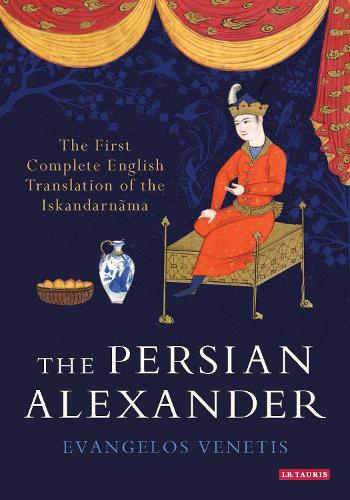
The Persian Alexander: The First Complete English Translation of the Iskandarnama
(Hardback)
Publishing Details
The Persian Alexander: The First Complete English Translation of the Iskandarnama
By (Author) Evangelos Venetis
Bloomsbury Publishing PLC
I.B. Tauris
27th October 2017
United Kingdom
Classifications
Tertiary Education
Non Fiction
Ancient, classical and medieval texts
Biography and non-fiction prose
938.07092
Physical Properties
Hardback
400
Width 189mm, Height 246mm
1043g
Description
Alexander the Great (356-333 BC) was to capture the imagination of his contemporaries and future generations. His image abounds in various cultures and literatures - Eastern and Western - and spread around the globe through oral and literary media at an astonishing rate during late antiquity and the early Islamic period. The first Iskandarnama, or 'The Book of Alexander', now held in a private collection in Tehran, is the oldest prose version of the Alexander romance in the Persian tradition. Thought to have been written at some point between the eleventh and fourteenth centuries by an unknown author, the lively narrative recasts Alexander as Iskandar, a Muslim champion - a king and prophet, albeit flawed but heroic, and remarkably appropriated to Islam, though the historic Alexander lived and died some 1,000 years before the birth of the faith. This new English translation of the under-studied text is the first to be presented unabridged and sheds fresh light onto the shape and structure of this vital document.In so doing it invites a reconsideration of the transformation of a Western historical figure - and one-time mortal enemy of Persia - into a legendary hero adopted by Iranian historiographic myth-making. Evangelos Venetis, the translator, also offers a textual analysis, providing much-needed context and explanations on both content and subsequent reception. This landmark publication will be invaluable to students and scholars of classical Persian literature, ancient and medieval history and Middle East studies, as well as to anyone studying the Alexander tradition.
Reviews
'This is a book which its author has lived, breathed and inwardly digested for more than a decade. He analysed the text in depth in his doctoral thesis and now he has translated it in its entirety, contextualising it with an impressive critical apparatus. This is one of a tiny handful of substantial medieval Persian prose romances to be rendered into a European language, and anyone interested in Persian or indeed comparative literature will also profit from this texts distinctive approach to storytelling. Above all, it is refreshing to encounter the iconic figure of Alexander the Great, who over the course of the centuries has undergone multiple transformations at the hands of Ethiopian, Arab and Turkish authors, in Persian guise. This Alexander is a globe-trotter, visiting Kashmir, Sri Lanka, Yemen, China, Russia and Andalusia, plus the Land of Darkness and the Queen of the Fairies. En route he fights demons, cannibals and hairy-footed men. There is something for everyone here.' Carole Hillenbrand, Professor, Universities of St Andrews and Edinburgh, 'The legendary life of the conqueror Alexander the Great is a central feature of Persian literature and tradition. Several long and distinguished epics recount his adventure and demonstrate his centrality to the Persian conception of the ideal ruler. The anonymous Iskandarnameh is one of the earliest, and includes many tales that are found in no other work, including the eleventh century Shahnameh which closely precedes it. The differences from contemporary Greek and European versions are remarkable, and yet in all of them Alexander remains a model of religious devotion as well as a tragic hero who leaves the world empty-handed. Evangelos Venetis elegant translation is the first to make the entire work available in English, and gives us once again an Alexander whose significance straddles east and west.' Richard Stoneman, Honorary Visiting Professor, University of Exeter; author of Alexander the Great: a Life in Legend and translator of The Book of Alexander the Great (the Greek Phyllada tou Megalexandrou).
Author Bio
Evangelos Venetis is the director of the Society for Hellenic-Iranian Studies in Athens and the coordinator of the Middle East Research Project of the Hellenic Foundation for European and Foreign Policy. He wrote his doctoral thesis on the Iskandarnama at the University of Edinburgh.
